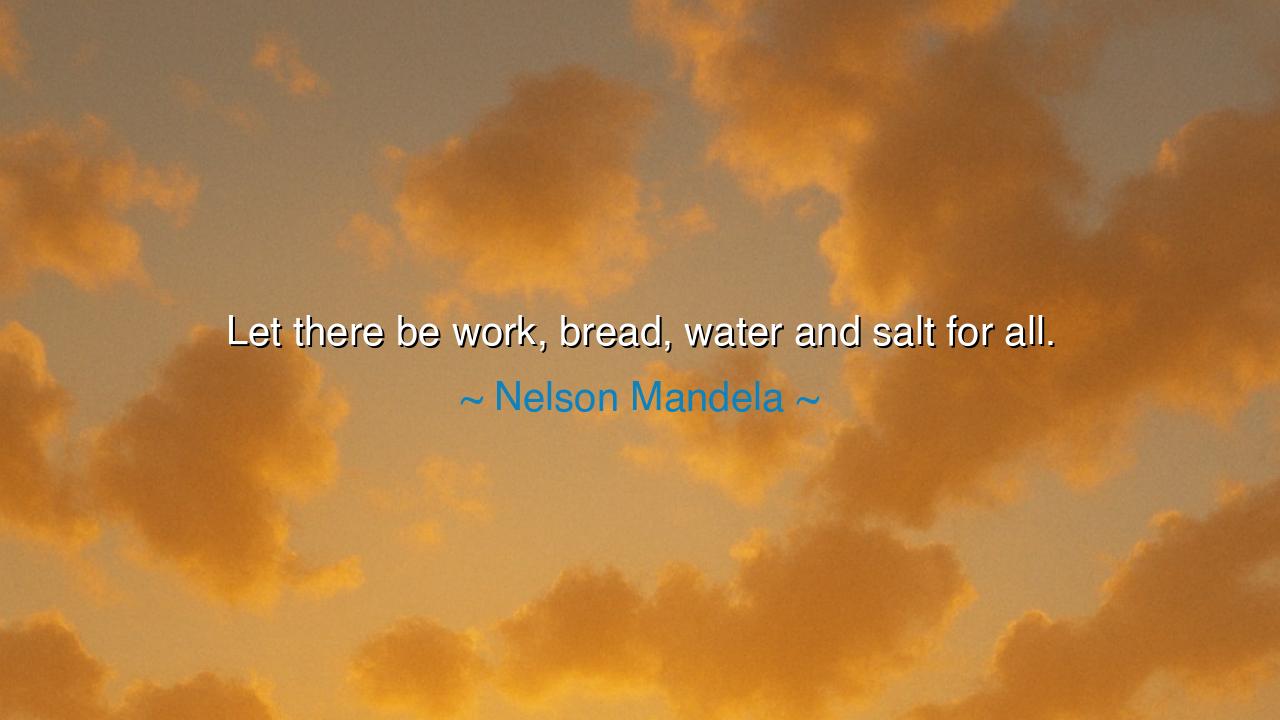
Let there be work, bread, water and salt for all.






The words of Nelson Mandela — “Let there be work, bread, water and salt for all.” — shine with the simplicity of truth and the grandeur of justice. They are not clothed in ornament, yet they carry the weight of centuries of struggle. For what Mandela names are not luxuries, but the very foundations of human dignity. To have work is to have purpose, to have bread is to be nourished, to have water is to live, and to have salt is to preserve life with flavor and meaning. In this brief utterance, Mandela compresses the cry of the oppressed into a vision for all humanity: that the basic needs of every man, woman, and child be met, so that none are excluded from the table of life.
Mandela, forged in the fire of apartheid’s cruelty, understood that oppression is not only the denial of freedom but the denial of sustenance. A man without work is stripped of dignity. A family without bread is condemned to hunger. A village without water withers into despair. And without salt, that ancient symbol of covenant and preservation, life becomes tasteless, survival stripped of joy. His words echo the wisdom of the ancients, who knew that justice is measured not by the wealth of kings, but by whether the poor have enough to live.
History is full of examples where the absence of these simple elements brought nations to ruin. In France before the Revolution, it was not lofty ideals alone that brought the people to the streets, but hunger. The scarcity of bread, the lack of salt — taxed beyond reach — drove ordinary men and women into desperation, and desperation into uprising. By contrast, wise rulers throughout history who secured food, water, and labor for their people created stability and peace. Mandela, like those sages of old, saw that true freedom cannot exist without the sustenance that allows it to flourish.
There is also a spiritual depth to his words. The ancients revered bread and water as sacred symbols of life itself. In many traditions, to share bread was to extend fellowship; to give water was to give life; to offer salt was to seal a bond of trust. By invoking these, Mandela was not only demanding material sufficiency, but calling for a society bound together by shared humanity. For if all have these basics, then no one lives as stranger or enemy, but all as partakers of the same table.
The power of Mandela’s phrase is found in its universality. He does not speak only for South Africa, though it was his home; he speaks for every land and every age. His words remind us that peace and prosperity cannot rest on riches for a few, while many go without. Without work, despair spreads; without bread, the body weakens; without water, life ceases; without salt, existence loses meaning. It is not wealth that makes a people strong, but the guarantee that none are left without these essentials.
The lesson for generations is clear: seek justice in the simplest things. Do not build towers of ambition while ignoring the hunger of your neighbor. Do not hoard water while villages thirst. Do not consume more than your share of salt and bread while others are deprived. True greatness lies not in abundance for the few, but sufficiency for the many. A society can only endure when the needs of all are met, and its prosperity is measured by the well-being of its most vulnerable.
In practice, let each listener take action. Support causes that provide food and clean water to those in need. Create opportunities for meaningful work so that others may stand with dignity. Share what you have, for in the sharing lies the blessing. And above all, cultivate a spirit of justice that sees in every hungry child, every thirsty soul, every weary laborer, a reflection of your own humanity.
Thus Nelson Mandela’s words endure as both command and blessing: “Let there be work, bread, water, and salt for all.” This is the foundation of peace, the heart of justice, the dream of a world where no one is forsaken. If we live by this creed, then the legacy of the great will not be monuments of stone, but the living truth of dignity shared by all people, in every place, for all time.






AAdministratorAdministrator
Welcome, honored guests. Please leave a comment, we will respond soon